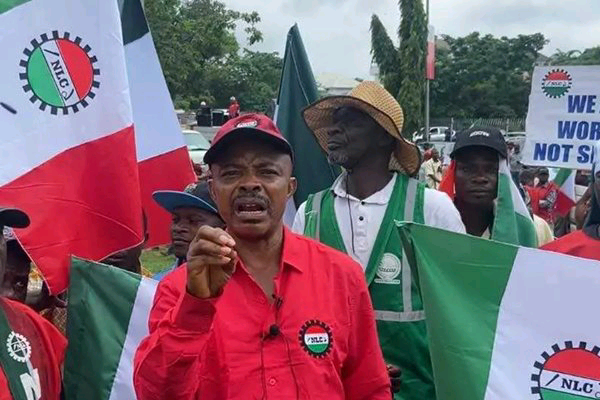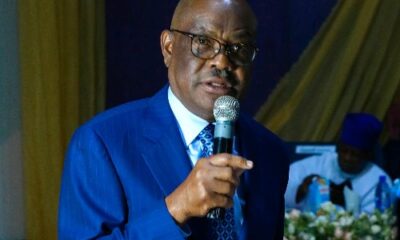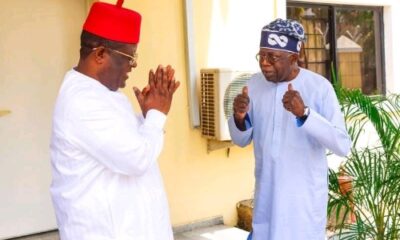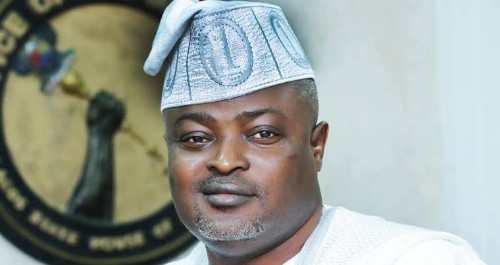Organised Labour, on Thursday, presented a list of 20 demands to the Federal Government as Nigerian workers observed the 2025 May Day at Eagles Square in Abuja and throughout the nation.
The Nigeria Labour Congress and the Trade Union Congress, among other requests, called for tax reductions, an improved retirement plan, the revocation of the emergency declaration in Rivers State, salary adjustments, the withdrawal of the Tax Bills, a decrease in telecommunication company tariffs from 50 percent to 35 percent, and an increase in the retirement age to 65 for all categories of civil servants.
The National President of the NLC, Joe Ajaero, formally presented these demands during the May Day event held in Abuja.
Making a case for better treatment for Nigerian workers, the NLC leader said, “It is imperative to extend the revised retirement age of 65 years or 40 years of service currently enjoyed by teachers, health professionals, and judges to all public servants.”
Ajaero, in 2023, said that the NLC would dialogue with President Bola Tinubu on the matter.
Already, teachers under the employment of the government at all levels are enjoying the implementation of a new retirement age, an Act signed into law by the former President Muhammadu Buhari.
Central to the workers’ demands was a call for economic justice.
They highlighted the urgent need for salary adjustments that reflect current economic realities, insisting that workers cannot continue to bear the brunt of inflation, rising costs, and policy failures.
The NLC and TUC criticised the existing PAYE tax system and demanded transparency in how the deductions are calculated and applied.
The labour centres further rejected the Tax Bills currently before the National Assembly, stating that these legislative moves have excluded the voices of Nigerian workers.
Ajaero insisted that workers must have a seat at the table during the formulation of tax policies that will directly affect them.
Reading a speech he jointly signed with his TUC counterpart, Festus Osifo, the NLC leader expressed frustration with the continued prioritisation of corporate profits over the survival of the ordinary Nigerian, calling for reforms that would shift focus toward the people.
Essential services such as energy, infrastructure, and public utilities, he emphasised, must be oriented toward serving the public interest rather than private gains.
In line with this, the organised Labour reiterated its longstanding demand for a comprehensive review, with the ultimate aim of a reversal of the electricity sector privatisation, which it argued has failed to improve service delivery while deepening economic hardship for consumers.
On matters of governance, it demanded democratic accountability, transparency, and urgent electoral reforms.
The labour bodies condemned what they described as a sustained suppression of civic space and dissent, calling on both federal and state governments to stop actions that erode citizens’ rights and instead work to strengthen democratic norms.
Security was also a major theme in their speech. They called for an immediate end to the widespread killings and bloodshed across the country, labelling the violence as genocidal and intolerable.
They expressed deep concern over the safety of Nigerian workers, both within their workplaces and in the general environment, urging the government to prioritise the protection of lives.
The leaders condemned the continued indiscriminate registration of new unions in sectors where existing unions already have effective coverage, warning that such actions weaken organised labour and threaten its coherence.
They demanded the immediate settlement of all outstanding allowances, pensions, and gratuities across the country, stressing that retired public servants, who devoted decades to national service, deserve a dignified and secure retirement.
Labour also raised the issue of what it described as dehumanising verification exercises faced by retirees, calling for more humane and efficient systems that respect the dignity of the elderly.
It pushed for the establishment of a nationally accepted minimum pension that guarantees retirees a life of dignity and demanded that pensions be automatically adjusted following inflationary trends to protect their real value.
The unions also reaffirmed their commitment to defending the rights and welfare of Nigerian workers.
They called on the government to engage in genuine dialogue and to treat workers not as adversaries, but as partners in the effort to build a just, prosperous, and equitable nation.
Ajaero said, “We make the following demands: An urgent reversal of the unconstitutional suspension of the elected Government of Rivers State via a state of emergency, which is alien to our laws.
“That the federal and state governments should cease actions that erode the civic space but should encourage and deepen it for the sake of our nation. An immediate salary adjustment in sync with economic realities.
“That government explains what exactly it is taxing in the PAYEE. The withdrawal of the Tax Bills before the National Assembly to allow Nigerian workers to sit at the table where it is being conceived.
“An immediate implementation of the reduction of telco tariff from 50 per cent to 35 per cent as agreed. Economic Justice: A living wage, fair taxation, and an end to policies that prioritise corporate profits over workers’ survival.
“Democratic accountability, transparent governance, electoral reforms, and an end to the suppression of dissent. Energy, infrastructure, and essential services must serve the people, not private interests. Regulators must work for the people!
“An end to the genocidal killings and bloodletting across the nation. Workers’ rights and security – Safe workplaces, the right to organise, and protection from state and employer violence.
“An expansion of National Labour Advisory Council’s activities and increasing the meeting periods: That the indiscriminate registration of new unions in areas with proper coverage should stop. Immediate payment of all outstanding allowances, pensions and gratuities across the nation.
“Restoration of gratuity payments: Public servants, who served diligently for decades, deserve a dignified exit just like political office holders who serve for much shorter periods.
“Upward Review of Retirement Age: It is imperative to extend the revised retirement age of 65 years or 40 years of service, currently enjoyed by teachers, health professionals, and judges, to all public servants.
“An end to dehumanising verification exercises in the public service. An acceptable National Minimum Pension to guarantee dignity in retirement. Automatic adjustment of pensions to reflect inflationary trends. Once again, we call for a review of the electricity privatisation exercise with the view to a reversal.”
In their respective speeches, President Bola Tinubu and the state governors pledged better deals, protection for workers.
Tinubu explained that his administration was determined to pursue a labour-first agenda that prioritises tougher workplace protections, employment security and a frontal assault on under-employment.
“On our part as government, we will continue to strengthen labour protections, improve job security and ensure fair treatment for all workers in line with international best practices,” Tinubu said.
Represented by the Minister of Labour and Employment, Maigari Dingyadi, the President praised labour as “the backbone of our society” and sketched wide-ranging reforms that span job creation, civic participation and an intensified fight against corruption.
His address comes amid double-digit inflation, rising living costs and growing worker unrest.
Addressing thousands of unionists and civil-society activists, Tinubu linked the pledge to Nigeria’s pending membership of the International Labour Organisation’s Global Coalition for Social Justice, saying the step would “anchor our labour administration system in world-class standards” across six pillars ranging from social protection to skills investment.
He also homed in on this year’s May Day theme, ‘Reclaiming the Civic Space in the Midst of Economic Hardship,’ describing a vibrant civic arena as democracy’s “cornerstone.”
The President promised to defend the right to organise, amplify marginalised voices and deepen transparency in government decision-making.
“Let me also express my profound appreciation to the leadership of the two national labour centres, the Nigeria Labour Congress and the Trade Union Congress of Nigeria, for their tireless efforts in organising this year’s May Day celebrations.
“The government recognises and respects your contributions in fostering dialogue, promoting workers’ rights, and ensuring that the voices of Nigeria’s workforce are always heard loud and clear.
“Your efforts and sacrifices have not only uplifted the lives of your members but have also contributed to the betterment of our society.
“As we mark this day, let us reaffirm our shared commitment to a nation where workers are safe, empowered, and have the freedom to actively participate in shaping the future of our country,” he said.
Tinubu affirmed that his administration stands ready to collaborate with labour unions, the organised and informal private sector, and civil society organisations to create policies and programmes that safeguard the rights and livelihoods of workers across all sectors of the economy.
He said this year’s theme speaks to the challenges Nigeria faces and the opportunities ahead of its people.
“The theme is one that demands our collective attention and serves as a stark reminder of the need to create an environment where every worker feels safe, valued, and empowered to contribute productively to the growth and prosperity of our nation.
“As your President, I assure you that this administration is committed to creating such a utopic climate for the common good.
“Economic hardship, which today is a global phenomenon, cuts across all regions, testing the resolve of world leaders, but has not broken our spirit,” he noted.
Tinubu acknowledged the squeeze on household finances, citing food and fuel costs, sporadic insecurity and widespread pressure to provide necessities for your families.
He argued that his Renewed Hope Agenda—anchored in job creation, poverty alleviation and support for the most vulnerable—offers a road map out of crisis.
The President explained, “I am well aware of the peculiarities of this economic hardship for Nigerians which is occasioned by the struggles and challenges you workers and indeed many Nigerians face ranging from rising costs of living, hunger, insecurity, unemployment, loss of livelihoods and the pressure to provide necessities for your families, amongst others.
“These challenges are real, critical and demand definite solutions, which I, as your President, am poised to address. It is in this regard that my administration is not only committed but intentional in formulating and implementing policies that promote job creation, decent jobs, poverty alleviation, economic growth and stability, as well as supporting the most vulnerable among us.”
However, Tinubu argued that economic progress alone is not enough. Therefore, “We must also reclaim the civic space, the space where ideas are exchanged, voices are heard, and change is born,” he argued.
According to the President, a vibrant civic space is the cornerstone of democracy, and it is essential for holding leaders accountable, fostering innovation, and ensuring that every Nigerian has a seat at the table.
Therefore, to reclaim this space, he said the organised labour must prioritise transparency, inclusivity, equity and dialogue.
“We must protect the rights of workers to organise, advocate, and participate in decision-making processes.
“And we must ensure that the voices of the marginalised are amplified, not silenced, as it is through this space that we can build trust, unity, and a shared vision for a brighter future.
“These we shall endeavour to pursue vigorously, noting that our workplace dynamics are evolving faster than ever before, recognising the emerging challenges such as technological advancements, environmental hazards, shifts in work patterns, and mental health concerns, which demand our innovative solutions,” said Tinubu.
He revealed that, in this regard, Nigeria is at the verge of signing onto the Global Coalition for Social Justice of the International Labour Organisation to ensure that Nigeria’s Labour Administration System not only resonates with best practice, but Nigeria’s voice is heard in the international arena of the world of work.
The President explained, “The guiding principles of the Coalition are centred around six thematic areas bordering on employment creation, social protection, sustainable enterprises, ensuring human dignity, addressing inequalities and skills investments, and are in tandem with our national priorities, particularly with the priority areas of our Renewed Hope Agenda.
“Furthermore, this administration shall continue to effect positive changes in the lives of average Nigerians, ensure that the downtrodden are elevated, and, most importantly, fight the intense pain of corruption, which has enriched the very few to the detriment of the majority of our citizens, who groan under the overwhelming weight of poverty and all the superstructural and infrastructural maladies resulting from corruption.
“It is against this backdrop that I urge you all to, on this Workers’ Day, reaffirm your commitment to the principles of fairness, equity, and justice.”
He called on the labour unions to work with his administration to ensure that every worker, regardless of their role or background, has access to opportunities that enable them to thrive.
In a related development, the Minister of the Federal Capital Territory, Nyesom Wike, has directed chairmen of the six Area Councils in the FCT to immediately implement and pay arrears of the national minimum wage to their workers.
Last Thursday, primary school teachers, health workers, and area council staff staged a protest to demand the payment of minimum wage arrears, among other concerns.
Wike, who was represented by the Head of the FCT Civil Service, Grace Adayilo, during his address at the 2025 International Workers’ Day celebration in Abuja, expressed concern over the ongoing industrial action by area council workers, triggered by non-payment of the new minimum wage.
He revealed that the FCT Administration had already disbursed the sum of N4.16 billion to the councils.
Wike said, “Distinguished ladies and gentlemen, we are deeply concerned about the ongoing strike action by Area Council employees over the non-implementation of the new minimum wage.
“I had approved the release of the sum of N4.166,194,061.25, which was paid to the six area councils. I once again call on them to ensure the payment of the minimum wage and its arrears to the workers.
“In a similar vein, the FCT Administration is also committed to improving the working conditions for teachers in the area councils, and has commenced the building, renovation and upgrading of school facilities, provision of learning materials, and other necessary support to ensure a conducive learning environment for both pupils and teachers.”
He reaffirmed the FCTA’s commitment to staff welfare, listing several initiatives including prompt salary and pension payments, staff training programs, upgraded office infrastructure, and improved promotion processes.
Drama in Kwara
A mild drama unfolded at the George Innih Stadium, Ilorin, the Kwara State capital, venue of the Labour Day celebration as police operatives attempted to stop a protest march by aggrieved staff of the Michael Imoudu National Institute for Labour Studies.
The protesting workers, clad in red t-shirts bearing the institute’s logo, carried placards accusing the Director General, Issa Aremu, a former National Vice President of the of the NLC of alleged mismanagement, insensitivity, and abuse of office.
Eyewitnesses said the police intercepted the protesters as they approached the Rashidi Yekini Main Bowl of the stadium, blocking their path and preventing them from accessing the main seating area. The officers reportedly claimed the protest could disrupt the Workers’ Day proceedings.
Unwilling to back down, the workers stood their ground, arguing that the celebration was meant to amplify workers’ voices. The standoff was eventually diffused when Comrade Ganiyu Balogun, Vice Chairman of TUC, Kwara State chapter, intervened.
Balogun appealed to the police to let the protesters into the venue and promised the aggrieved workers that they would be given an opportunity to display their grievances during the ceremonial march-past.
The protesters accused Aremu, a veteran labour activist, of a litany of infractions. According to them, staff development has grounded to a halt under his leadership, with no meaningful training or capacity-building initiatives. They also alleged that institute vehicles and funds were diverted for personal and family use, including overseas trips.
Further accusations include maintaining a lavish lifestyle—complete with convoys and escorts—despite the institute’s deteriorating infrastructure. They claimed that hostels and training facilities were in disrepair, eroding the institute’s effectiveness as a labour training hub.
Comrade Balogun, however, noted that the TUC had been engaging with the institute’s management over the past ten days regarding the workers’ concerns. “We expected them to inform us of the planned protest, which they didn’t,” he added.
The unfolding crisis raises questions about the state of leadership at MINILS and the ability of labour institutions to maintain internal harmony even as they advocate for workers’ rights nationally.
Efforts to get the reaction of the MINILS DG proved abortive as his phone number did not go through.
More efforts made to get the reaction of the DG through the institute’s Public Relations Officer, Mrs Rachael Solomon, was not also successful as she said that her calls to the MINILS DG could not get through.
Credit: The Punch
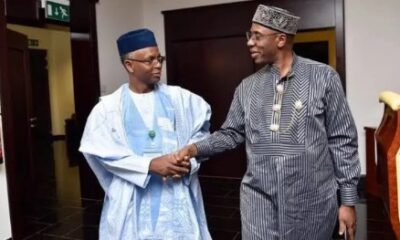
 BIG STORY4 days ago
BIG STORY4 days ago
 BIG STORY2 days ago
BIG STORY2 days ago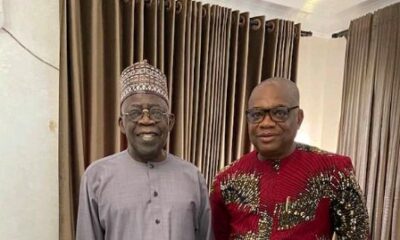
 BIG STORY4 days ago
BIG STORY4 days ago
 BIG STORY3 days ago
BIG STORY3 days ago
 BIG STORY3 days ago
BIG STORY3 days ago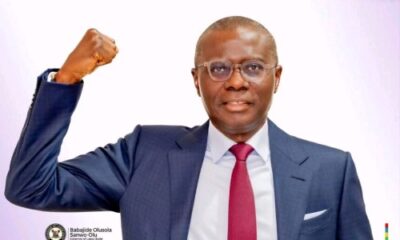
 BIG STORY5 days ago
BIG STORY5 days ago
 BIG STORY3 days ago
BIG STORY3 days ago
 BIG STORY3 days ago
BIG STORY3 days ago




